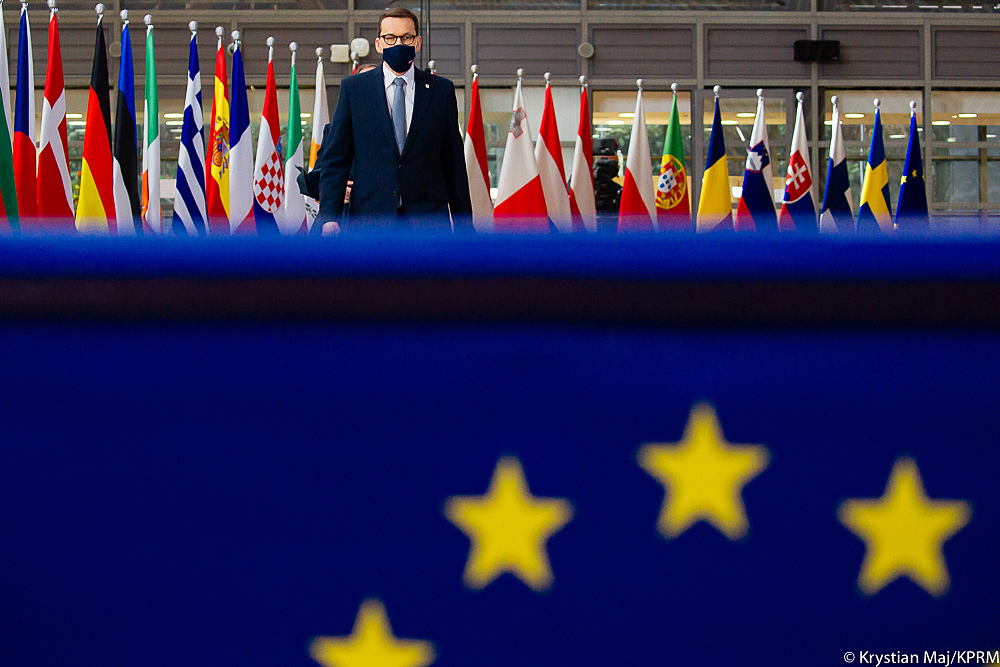Poland will become a net contributor to the European Union budget within the next decade, thus gaining a “new status” in the bloc, promises ruling Law and Justice (PiS) party chairman Jarosław Kaczyński. The country is currently the biggest net recipient of EU funds.
Both Kaczyński, who is Poland’s de facto leader, and Prime Minister Mateusz Morawiecki have declared in recent days that the country’s GDP per capita, adjusted for purchasing power, can catch up with the EU average over the next ten years thanks to the government’s new economic programme.
🇵🇱 #PolskiŁad to przede wszystkim plan dogonienia Europy do końca tej dekady. – Prezes #PiS J. #Kaczyński. pic.twitter.com/L35yIH8FYd
— Prawo i Sprawiedliwość (@pisorgpl) June 21, 2021
As early as 2029, but certainly by 2031, “Poland would already be at the level that will make us a payer in the EU, that is, one who pays more than they get,” said Kaczyński on Sunday.
“This will provide us with a new status, and above all will greatly increase our standard of living and the strength of our state,” he added. Since joining the EU in 2004, Poland had received a net €127 billion by late 2020, reports Politico Europe.
The single most important chart imo by @POLITICOEurope. Exposes the incredible hypocrisy by countries such as #Poland and #Hungary who are the biggest net beneficiaries of the EU Budget.
Full article here ➡️ https://t.co/ByI63XFEvy#EU @EU_Commission #EUBudget pic.twitter.com/BBjijdkZQ8— Felix Wolf (@F3lixWo) February 20, 2020
Kaczyński also said that the country would “catch up with Europe by the end of this decade” in terms of reaching the European average income per capita adjusted for purchasing power.
Poland has to date reached 76% of the European figure, according to data from Eurostat. But this is “still not enough”, said Kaczyński on Sunday, noting that Slovenia, the richest of the post-communist countries, has reached 92%.
“In a decade we will not catch up to 100%, but we will be at around 90%,” says Marcin Piątkowski, professor of economics at Kozminski University in Warsaw.
“This will still be the highest level of relative income in all of Polish history and proof of the continuation of the economic golden age. We have a chance of catching fully by 2040,” he told Notes from Poland.
"Poland is richer than Portugal," writes @Money_pl, noting that Poland's GDP per capita at purchasing power parity is now higher than Portugal's.
Poland had previously overtaken Greece, and could move past Italy within a decade, they report https://t.co/FhzNoIKhoK
— Notes from Poland 🇵🇱 (@notesfrompoland) February 26, 2020
That promise has been echoed in recent days by other senior figures, including Morawiecki, who said yesterday that Poland would implement educational and economic programmes to “reach the level of at least the average EU GDP”.
It is a pledge made by PiS repeatedly over the years, with Morawiecki saying in 2017 that “we assume that in 2030 GDP per capita will reach the EU average”.
In his latest remarks, Kaczyński said that the government’s recently unveiled “Polish Deal” (Polski Ład) economic programme is “above all a plan to catch up with Europe”.
The initiative, outlined in May and with clearer details to be announced over the rest of this year, will include higher healthcare spending, extended support for parents, homebuyers and pensioners, as well as large-scale infrastructure investments. It also features an overhaul of the tax system.
The Polish Deal, which has been presented as a means of recovery from the pandemic, is also seen as an opportunity for the government to set out a programme ahead of the next parliamentary elections. Senior officials have toured the country to promote it and shore up support to help push the package through parliament.
Last week, PiS also struck an agreement with small populist party Kukiz’15 to support the programme in exchange for concessions on fighting corruption and judicial reform.
This article was updated to include new comments from Marcin Piątkowski.
Main image credit: Krystian Maj/KPRM (under CC BY-NC-ND 2.0)

Maria Wilczek is deputy editor of Notes from Poland. She is a regular writer for The Times, The Economist and Al Jazeera English, and has also featured in Foreign Policy, Politico Europe, The Spectator and Gazeta Wyborcza.




















